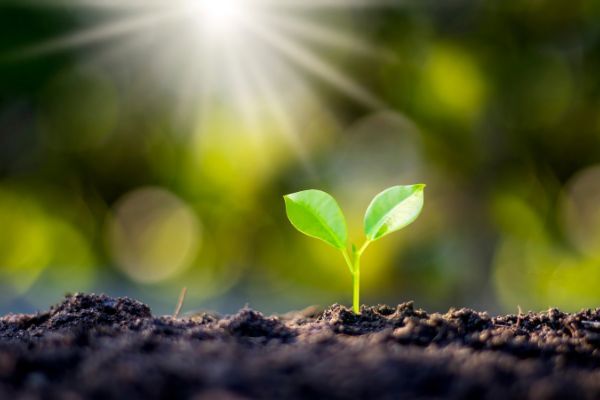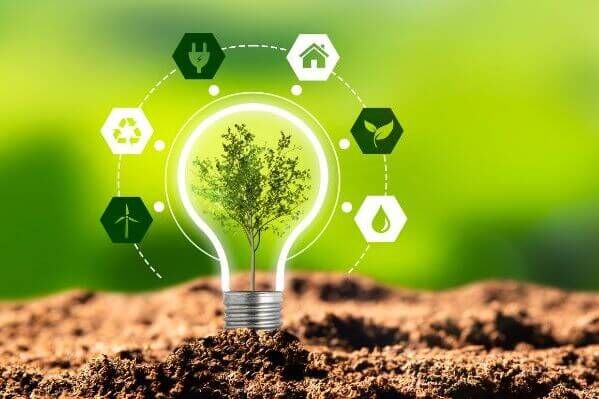
WHAT IS SUSTAINABILITY?
Sustainability goals can look different. Primarily, it means using as few resources for your endeavor as possible. Sustainability means taking stock of all ecologically relevant processes that affect the product or service in the value chain.
A small example: do you know the MatchBox® aluminum cars from your childhood? They were virtually “indestructible” and even today subsequent generations still play with them. Is that sustainable? Yes! While aluminum per se is not the healthiest or most ecological material, this long service life makes a significant contribution to sustainability. Another example: a manufacturer of orange juice has a new marketing strategy, advertises sustainability and its new sustainability goals. You buy twice as much orange juice in plastic bottles based on that as you would otherwise. Now the manufacturer’s sales are skyrocketing, but the sustainability aspect is not being met. This is partly because the number of plastic bottles needed and other resources required for production, such as electricity and gas, are skyrocketing. What can be done here in terms of sustainability? Well: it would be more sustainable, more ecological and also tastier to press the orange juice yourself.
WHAT DOES SUSTAINABILITY MEAN?
Sustainability means critically questioning whether a product or service, or the implementation and production of it, is still justified in today’s world.
Many of us pursue a job to earn the maximum possible. In exchange for payment, we give our time and knowledge. Only a small percentage of us engage in employment to create value for the world and future generations. Numerous employees work for the largest companies in the world. Among them industrial giants like Bayer, Coca Cola, VW, Samsung and the like. This supports these long-established companies and ensures that they can continue to operate successfully. First of all, this is nothing bad and completely legitimate. However, most of these large corporations have one thing in common: they know how to make money and make it sustainably. A keyword which fits well at this point is “predetermined breaking point”. By now, it is well known that after a certain device lifetime, parts break or stop working so that the consumer has to buy something new – not a sustainable development. Alternatively, the respective lobby or interest group, equipped with a lot of money from the corporations, takes care of convincing consumers that a certain product or service is still the best and that one should not switch to alternatives. There are numerous examples for this thesis. Among others, Monsanto, the dairy industry or the pesticide industry of pest control. There are numerous studies that prove that the best way to keep mice away, for example in the supermarket, is with traps and sealing measures. A very effective, sustainable and ecologically good solution. These measures cause slightly higher one-time costs and are often not implemented because, conversely and after this simple problem-solving, no more monthly revenue can be generated – not a very sustainable development.
AN EXAMPLE: ECOLOGICAL SUSTAINABILITY

You have a mouse in the supermarket and it reproduces. Every week poison is laid out, after all, much helps much and so money can be made with it again and again. Nevertheless, the mice prefer to eat chips or chocolate and hardly take the bait laid. The pest controller continues with this strategy, pointing out that mice are found dead from time to time. Instead of this outdated strategy, it would already help to locate the weak points and gaps and seal the supermarket.
So mice can not get inside or hide. Simple, quick to implement and ecologically sound solutions can be steel wool, hygiene, waterproofing, door brushes, merchandise control or clean-up. A Nebraska study shows that as few as 85% of pest problems can be eliminated through cleanup and sanitation. This can be imagined by anyone who has ever found a mouse in the crowded kitchen or neglected attic.
So now, if the pest controller takes the environment, sustainability and his work seriously, he conscientiously and extensively advises the supermarket. It shows him that he can only achieve his sustainability goals if he cleans up, seals up or cleans up. In addition, it shows him that instead of numerous poison baits, he only needs to set a few traps. As soon as the trap shows an infestation after these measures, for example by visual inspection, by beep sensors or IoT monitoring, the problem must then be corrected. It is then necessary to move to control measures: trap the mice in the area, possibly set more traps and work with hygiene measures and sealing.
An anonymous major industry customer did just that. For his stores, he removed 96% of his boxes and changed visits from weekly intervals to four to eight visits per year. A very sustainable and ecologically good development, in that now his employees or the digital traps have indicated the infestation. Lo and behold, the pest rate beyond 100 days has dropped by 55%. That is sustainability by definition: to completely rethink a process or a product – without always looking at the money – to be courageous and to change the world a little bit, as Apple founder Steve Jobs already taught us.
ECONOMIC SUSTAINABILITY
Ecology Sustainability and economy Sustainability goals are not always concurrent or work hand-in-hand. The heads of many large companies have a different 2030 Agenda for Sustainable Development. Their 2030 Agenda for Sustainable Development states, above all, that they will achieve their bonus and royalty targets. Of course, it can be assumed that they also believe in the product or service. They will also be aware of the relevance for sustainable development and sustainability goals. However, people like to be blinded and believe the sustainability story of the company, for the sake of money, without questioning. The federal government, by the way, does not have an easier time of it, since it is virtually a large Democratic enterprise. It is just as difficult for the federal government, as politicians and politicians in the federal government fight to keep their posts. Of course, at some point you started because you wanted to make the world, your country or your company greener, more democratic or economically stronger. Nevertheless, many in the federal government lose sight of the essentials due to economic or pecuniary goals (i.e.: money). Man tends to become comfortable and adapt.
Here, everyone should question themselves and consciously make a decision for themselves. Am I doing my job just for the money? Or do I do it because it fulfills me and I want to contribute to sustainability and a secure future for my children or my children’s children?
SUSTAINABLE DEVELOPMENT FOR OUR PLANET EARTH
Salaried bosses or owners and shareholders who have become rich often lose touch with the company. They get out, become philanthropists, art collectors or the like. Few entrepreneurs do not attach much importance to goods and status. This way of looking can be very inspiring. Because if you see capital as an opportunity, you can make great things happen and support sustainable development.
“Give a person power and you learn his true character”. As crazy as leaders like Elon Musk are, they are also crazy for dedicating large portions of their wealth to protect and optimize the future of humanity. This is sustainability: not financing the next super yacht, but considering whether the money can be used for sustainability of the environment and nature on our planet.

Jobs and their monetary incentive systems, such as bonuses and incentives, ensure that CEOs often see the money first, rather than the incredible opportunities they might have if sustainability were more important to them. Often in these contexts, there is sustained development in the wrong direction, as well as a mismatch of great talent with the wrong motivation. Not that we are allowed to judge what is wrong and right at all. However, since this article is about sustainability, it could be correct that – in terms of sustainability – it is more “wrong” than it is “right.” Feel free to write us your opinion about sustainability in the comments!
SUSTAINABILITY STOCK EXCHANGE
Fortunately, there is hope regarding sustainability: For 2023, the EU has decided that the new EU Taxonomy Regulation will by decree steer sustainability for large investors in the direction of ESG, Sustainability Environment, Social and Governance. In German: The rich pension funds of this world are no longer allowed to choose completely freely and independently where they invest so that their money is potentially increased. No, they have to make sure that they invest the money primarily in ESG companies; companies that care about sustainability and can prove it with hard facts.
Almost any company today can quickly become certified as a carbon neutral company. For example, by making certain compensation payments to support climate protection projects elsewhere. This is basically good but often difficult to understand. Nevertheless, large companies pay so many millions that can be invested elsewhere. For example, in reforestation or marine conservation. Doesn’t that sound great? Yes! But of course, it must not then happen that these companies – by buying or trading CO2 certificates or GreenCards – suddenly become ESG-compliant. True sustainability means that these companies must also disrupt their business itself. Sustainability means asking yourself: Is what I’m doing worth thinking about?
An entrepreneur we cannot name today (one of the oldest family-owned companies in the world) once presented in a private congress that he had research done on how long and if his company would still be relevant in 20 years. The result: No, it is not. His solution to this: continue to preserve everything as long as possible without causing damage. At the same time, use the means and opportunities to achieve new sustainability goals with sustainability. For example, start a new business or acquire shares in green startups or mid-sized companies and support them with liquid funds. The realization that one’s own business, i.e. the family’s cash machine, is no longer sustainable and viable for the future is a hard and very honest realization. Most people like to look the other way because, to be honest, it’s convenient. But convenience and the approach of doing everything as before has never changed the world.
SUSTAINABILITY DEFINITION
Is it even necessary or meaningful to “change the world”? Spoiler: Yes. Industrialization has brought positive things to many of us. For example, warmth, prosperity, health systems and security . We humans have adapted and evolved, our environment and our living conditions. Thus, a large part of the population today enjoys the benefits that industrialization has brought. This is something we can be proud of. But: the attitudes of “it’s always been this way” and “we’re not changing that” did not help. It was the “crazy ones”. Those who thought they could invent a light bulb, an automobile, a pharmaceutical, a vaccine, a chemical, or machines and technology.
Sustainability means to think crazy and to question, detached from motives and especially from money and security. Sustainable development means daring to do something, daring to think differently. As Steve Jobs said at the time: “Only those who are crazy enough to think they can change the world are the ones who end up changing it”.
Our thesis is: We have to change the world. With Futura, we will transform the pest control industry and with it a 30 billion industry. From 99% application of chemistry to the use of 99% Internet of Things, SAAS and DATA pre-cognition, combined with sensible IPM pest prevention methods. Why? Because we can, and thus contribute to the sustainability of our planet by massively reducing poisons in the environment (which, according to outdoor studies, affect pests in only 20% and non-target animals like birds and foxes in 80% – read more in our blog post “Rodenticides against rats and mice”). Because we can sustainably reduce the carbon footprint of our industry, since the solutions we offer mean that daily car journeys from customer to customer are no longer necessary. Because we bring in IoT devices and solutions that perform checks automatically. With this, we will manage the sustainable development of pest control and make the world just a little bit better, but a tangible and relevant bit for us.
Everyone has to deal with pests. For example, millions of tons of unused food are destroyed by pests each year and must be disposed of. We control pests effectively and sensibly with tech solutions, managing human health, as well as food protection. Nevertheless, we make sure that these animals get a respectful treatment.


